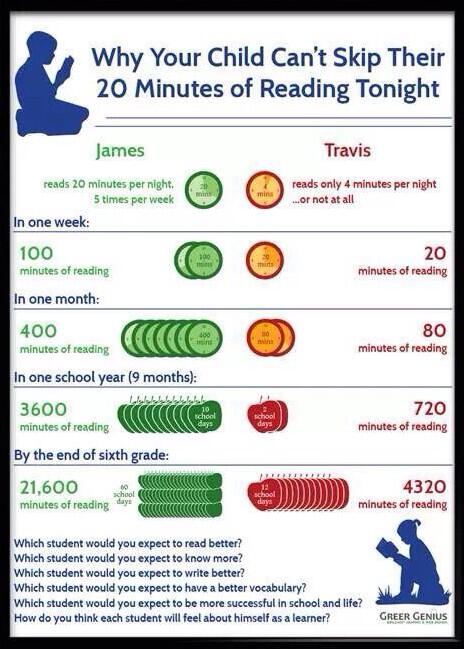March 2nd marked the 17th annual Read Across America Day and Dr. Seuss’s birthday. Here is why every day should be a day for reading.
Below, you will see a great infographic on the difference between a child who reads 20 minutes a day, 5 times a week, and a child who averages 4 minutes a day, 5 times a week (if even that). If you wonder how your child fares in the reading department, consider a child who reads 15 minutes, 3 times a week. That child’s figures would be about half of what the green numbers show below.
Also, just as you make sure your children get a well-balanced meal, help your children learn to balance the types of things they read. Here is one article on Fiction v. Nonfiction and another article on the benefits of nonfiction (especially for ELLs). An additional article that may be helpful includes: Non-Fiction Reading Promotes Student Success.
Other articles on The Education Cafe about reading you may want to read:
The Reading Road to Speaking Right — Speech and Language Development
High Frequency and Sight Words Grades K-6
Better Together
 You can vote once every 24 hours just by clicking the image . . . and make The Education Cafe number one! Thanks!
You can vote once every 24 hours just by clicking the image . . . and make The Education Cafe number one! Thanks!




If you have a child or student who is an ELL or is developmentally delayed, or if your child just hasn’t been in the practice of reading regularly and is “behind” in minutes per day, you can consider encouraging the following to “catch up”:
1) Have your child read 20 minutes 7 times a week (instead of just 5);
2) Have your child continue this reading plan year round (12 months instead of just 9);
3) Consider increasing the reading time to 30 minutes a day (this can be two 15-minute periods of reading. [Some parents require a certain amount of reading to earn TV or gaming time.]